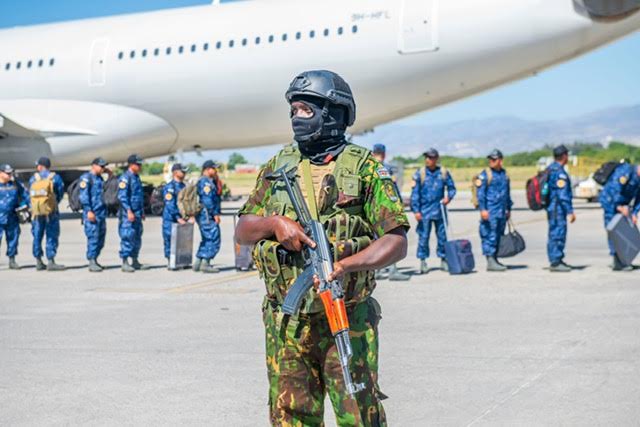

The war on criminal gangs in Haiti got a boost when 70 Salvadoran soldiers arrived with medical equipment.
They now join the personnel from Kenya, Guatemala,Jamaica, Belize and Bahamas who are on the ground and are part of the Multinational Security Support Mission(MSS).
The new team was welcomed in Port-au-Prince by among others the head of local police Rameau Nomil and MSS force commander Godfrey Otunge as well as members of the diplomatic corps, notably the French ambassador Antoine Michon and the Canadian ambassador André François Giroux on February 4.
These soldiers will assist with medical evacuations during anti-gang operations.
This contingent brings with it a wealth of expertise in air support, which will be invaluable for both casualty evacuation and medical evacuation operations within the Mission.
The helicopters from El Salvador are expected to land by the end of the week.
A state of emergency has been in place across the Caribbean nation for months as the government battles violent gangs that have taken control of much of the capital Port-au-Prince.
The forces are in Haiti to boost a United Nations-backed security mission led by Kenya that has so far failed to prevent violence from escalating.
Heavily armed gangs in Haiti have attacked a neighbourhood that's home to most of the country's elite and had been largely untouched by criminals, and police have demanded help repelling the assault that killed at least 40 people on Monday, February 3.
Meanwhile, French President Emmanuel Macron has asked the United Nations to consider sending a peacekeeping force to Haiti.
The suggestion was made in a letter Macron sent to the U.N. after meeting with Leslie Voltaire, president of Haiti's Transitional Presidential Council at the Elysee Palace in Paris.
Kenya sent nearly 600 police officers to help combat the gangs.
This was the first tranche of a UN-approved international force that will be made up of 2,500 officers from various countries.
There are however concerns that even if the team manages to dislodge the gangs from this stronghold, the absence of an immediate and lasting occupation by the police or the army will allow them to return quickly.
But even 1,000 security personnel or the mission’s targeted goal of 2,500 is insufficient, security experts say.
Chronic instability, dictatorships and natural disasters in recent decades have left Haiti the poorest nation in America.
Last year, Haiti saw a record number of neighbourhoods in Port-au-Prince and surrounding areas fall to armed gangs, despite the presence of foreign forces and a new U.S.-backed transition government.
As the gangs took over neighbourhoods and carried out some of the worst massacres in recent memory, they also deepened the country’s humanitarian crisis as tens of thousands more Haitians were forced to flee their homes.
The United Nations said more than 5,600 people were killed by gang violence last year, an increase over the previous two years, and over 1 million Haitians are now displaced.
Kenya promised 1,000 police officers as part of its offer to lead the mission.









